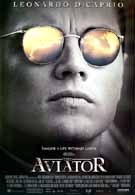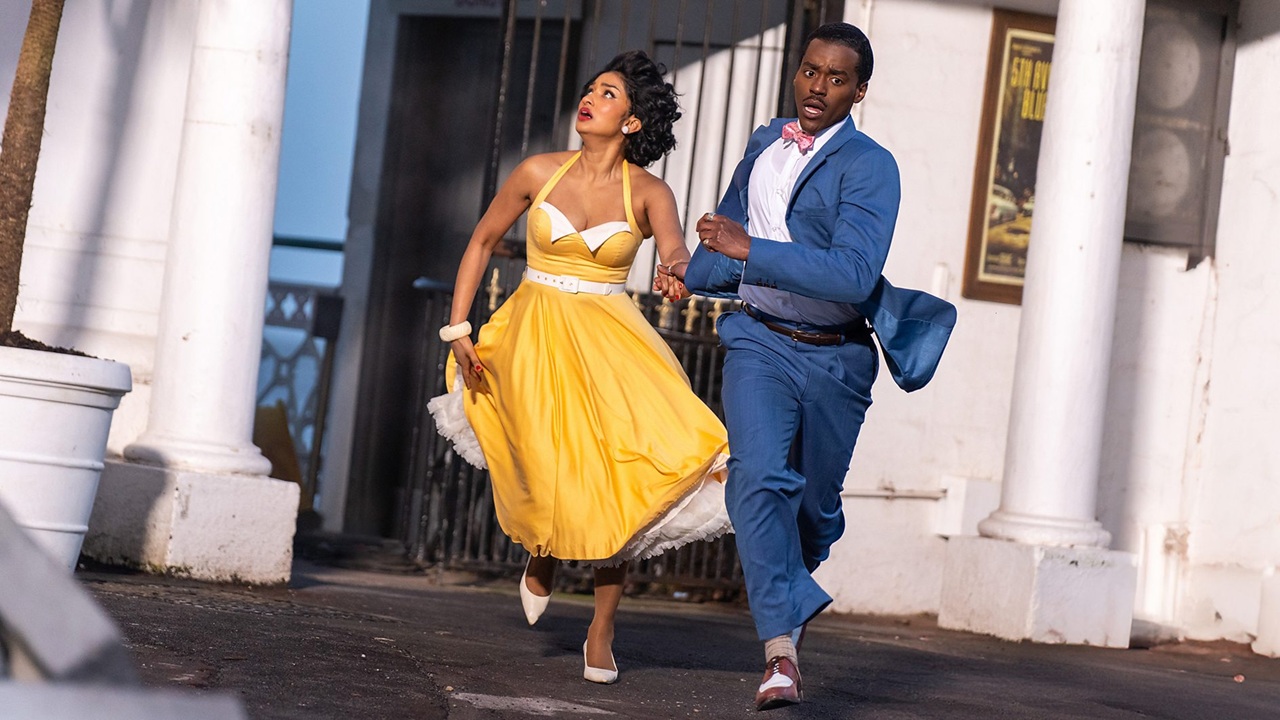After coming up with a dud in Gangs of New York, it looked like some of the luster had left Martin Scorsese. The filmmaker it was cool for everyone to love, indie snob and pop culture fanatic alike, seemed to be losing his edge. Forget all of that. Scorsese is back. The Aviator is his first legitimate masterpiece in at least a decade, and may in fact be his best work ever. Does that also make it the best movie of the year? It’ll be close.
What the trailers for The Aviator aren’t showing you is what this movie is truly about. This isn’t just a fantastical tale of the golden age of flight. Sure, that’s part of it, but this is primarily a movie about a genius’s gradual slip into madness. In the midst of losing his mind, Howard Hughes (Leonardo DiCaprio) changes the face of aviation, woos the most famous women of early Hollywood, and takes on a corrupt U.S. government. He also makes a gigantic airplane out of balsa wood; no doubt in the process innovating new methods of beaver repellent. All of his ideas weren’t hits. The stress of struggling to achieve his dreams takes its toll on Howard, aggravating an already delicate mental state and a tendency towards germ-phobia. The movie’s most gripping moments are with Hughes in private, frantically clawing to restore his own sanity, if only just long enough to accomplish one more stupendous, impossible thing. Hughes eventually loses his battle, becoming a completely crazed agoraphobic, germ-obsessed hermit. In his later years, the genius aviator, the driven industrialist, the millionaire playboy simply locked himself away in a single room and never came back out again. But by then, his accomplishments had almost become myth, and his status as one of the heroes of American individualism was set in stone.
The Aviator presents lush new visual territory for Scorsese and his cinematographer Robert Richardson to tread into. The film is awash in glamorous and period specific colors, set designs, and energetic aerial sequences. Notable is the filming of Hughes’ problem plagued war movie, Hells Angels in which we follow Hughes on his camera plane as dozens of bi-planes rip, soar, dive, and scream past him. It’s as if the wind of their passage is blasting right out of the screen as the planes’ pilots put their crafts through wild, up close and personal acrobatics. The sequence is breath-taking in its audacity and all the more so beautiful for the sight of a veritable cloud of antique planes roaring through the sky. It’ll give you goose bumps, as will a particularly authentic feeling plane crash later in the film.
As is any biopic, The Aviator is primarily an actors movie. Scorsese at last gets something great out of his Muppetesc muse DiCaprio, reminding us all that we used to think Leo was pretty good before he fell off the Titanic. We were right. Towards the end of the film, when things really start to fall apart for Hughes, the way DiCaprio brings his fight to pull himself together to the screen is monumental. He’s like an unbelievable storm slowly being beaten down by forces even greater than his own. By contrast his childlike enamor with airplanes and his unstoppable drive to bring flight to everyone is a wonderful window for the audience into Hughes’ world. DiCaprio captures all of that and more, this is his most defining role. Cate Blanchett is decidedly terrific as Katherine Hepburn, giving a performance similar in uncanniness to Jamie Foxx’s impressive work in Ray. She makes Kate every bit the luminous (if eccentric) being we all knew she must be. I left the theater desperately wishing there was some way I could have known her or met her, even for a moment or two. Never has any real life person been portrayed on film as being so fantastically alive.
In bringing Hughes’ life to the screen, Scorsese comes up with a film that is both intricate and compelling. This is superior screenwriting indeed. John Logan’s script and Scorsese’s amazing direction give us subtle clues to Hughes’ deterioration while swimming comfortably in the wonder and innocence of the era. They find a perfect harmony between helping us understand Hughes’ losing war against flagging mental health and portraying the man as an American legend, an embodiment of the American spirit. The film immerses itself in both the glitz and darkness of Hollywood’s golden age, in the style of the times with amazing music and nostalgic décor. There’s something wonderfully magical about having people like Cary Grant (Michael-John Wolfe), Jean Harlow (Gwen Stefani), Errol Flynn (Jude Law), or Ava Gardner (Kate Beckinsale) traipsing about as background characters in your film, knowing full well that this isn’t a fantasy, in some form or another it really happened.
Howard Hughes had a dream for the future, and put everything he had on the line to build it. Scorsese has brought his dream to life, flaws, foibles, failures, and all in a stunningly dramatic masterwork. This is Scorsese at his most breathtaking and cinema at its best.











